- Home
- Hammond Innes
Campbell's Kingdom Page 17
Campbell's Kingdom Read online
Page 17
The doctor, of course, wanted me to go straight into hospital. But I refused. I was afraid once I got inside a hospital I’d never get out. I’d been better in the cold, crisp air of the Rockies. I wanted to get back there. I felt that time was running out and if I were going to die I wanted to die up in the Kingdom. As I lay in my bed in the Palliser Hotel, in a half coma of inertia, this became almost an obsession with me. I think it was this that pulled me through. I just refused to die down there in Calgary with the level ground of the ranchlands spreading out round me and the dust blowing through the streets.
A few days later, very weak and exhausted, I staggered down to Winnick’s car and we headed north for Edmonton and Jasper. We spent the night at Jasper and Johnnie Carstairs and Jeff Hart came to see me in my room. I remember something that Johnnie said to me then. Winnick had told him I’d been ill and he knew what the cause of it was. He said, ‘Take my advice, Bruce. Stay in the Rockies. The mountains suit you.’
‘You may be right,’ I said. ‘I was damn glad to see them again.’
He nodded. ‘Climate is the same as food. What you want is what you’re deficient of. And no damned quack blethering a lot of scientific nonsense will convince me otherwise. You stay up in the mountains, Bruce.’
‘I intend to,’ I said. ‘I’m going up to the Kingdom.’
He nodded. ‘Well, if they try and smoke you out, send for me.’
Next day we made Keithley Creek and the following morning we ploughed through the mud of the newly-graded road to Come Lucky. Now that I was in the mountains again I felt better. My heart was racing madly, but the air was cool and clear and I was suddenly quite confident that I should get my strength back. The sight of the peaks of Solomon’s Judgment against the clear blue of the sky gave me the same feeling that the cliffs of Dover had done when I came back at the end of the war; this was home to me now.
We didn’t turn up to the bunkhouse, but continued straight along the lake-shore road to the dark, timbered mouth of Thunder Creek. I had warned Winnick that we might not be allowed to go up by the hoist, but he wasn’t convinced. He was Henry Fergus’s oil consultant and he’d known him since they were kids together. He thought that would be enough.
But it didn’t work out that way. About a mile up the creek where the road cut back into the mountainside to bridge a torrent we were stopped by a heavy timber gate supported by a tall post like the corral gates around Calgary. There was a log hut with an iron chimney that sent a drift of wood smoke through the trees. A man came out of it as we drew up and through the open doorway I saw a rifle propped against a wooden bench. ‘Can I see your pass?’ The man was short and stocky and he was chewing gum.
I certainly hadn’t expected precautions as elaborate as this and my companion was equally surprised. ‘My name’s Winnick,’ he said. ‘I’m a friend of Henry Fergus.’
‘I don’t know any Henry Fergus,’ the man replied. ‘I take my orders from Trevedian and he says you got to have a pass if you want to go on up to the camp.’
‘Who’s in charge up at the camp?’
‘Fellow named Butler, but that won’t help you, mister. You got to have a pass signed by Trevedian an’ Trevedian’s down at Come Lucky. You’ll find him at the company’s office.’ The last words were almost drowned by the sound of a horn. ‘Pull over, will you. There’s a truck coming through.’ I turned round. Coming up the grade behind us was a big American truck, heavily loaded and grinding up in low gear.
We pulled into a turning section that had been bulldozed out of the hillside and watched the truck grind pass, through the wide-swung gate. It was loaded with bags of cement roped down under a tarpaulin. ‘For two pins I’d crash through behind it,’ Winnick said.
‘You’d only get your tyres shot up.’ I nodded to the open doorway of the hut.
He didn’t say anything for a moment, but sat staring first at the rifle inside the hut and then at the man who was leaning on the gate watching us. At length he put the car in gear, turned her and headed back down the valley. ‘Seems you were right after all. We’ll have to find Trevedian.’
‘You won’t get a pass out of him,’ I said.
‘Of course I will,’ he said.
We were running out of the timber and the lake lay blue in the sunshine and the whole hillside above it glistened with water from the melted snow so that the shacks of Come Lucky were like dilapidated houseboats plunging down the glittering cascade of a fall. He swung the car up towards Come Lucky and stopped at Trevedian’s office. ‘You wait here,’ he said.
He was gone about ten minutes and when he came out his mouth was set in a tight line. ‘We’ll have to ride up,’ he said. ‘Do you know where we can get horses and a guide?’
‘No,’ I said. ‘Unless . . .’ I paused, looking up to the line of shacks that marked the single street of Come Lucky. Then I climbed out of the car. ‘Let’s walk up to the hotel and have a drink. There’s just one person who might help us.’
‘Who’s that?’
I didn’t answer. It was such a slender chance. But if we didn’t get horses here it would mean going back to Keithley and starting out from there. As we walked up along the rotten boarding of the sidewalk to the Golden Calf Winnick said, ‘Maybe you were right about that survey.’
‘How do you mean?’
‘About Henry arranging for the recording tapes to be switched. When Trevedian refused to give us a pass to go up the creek, I got through to Calgary. Henry told me I’d no business to be here. He warned me that if I continued to act for you he’d see to it that I got no more business from his companies or from any of his friends. I knew he was a cold-blooded devil, but I never thought he’d try to pull a thing like that.’
‘What are you going to do?’
‘Go up to the Kingdom with you.’
We had reached the Golden Calf. As we pushed open the door old Mac came to meet us. ‘Ah’m sorry, Wetheral,’ he said sourly, ‘but ye ken verra well Ah canna have ye here.’
‘Trevedian phoned you we were coming up, did he?’ I said.
He shrugged his shoulders awkwardly. ‘Ah canna help it, man.’
I said, ‘Well, don’t worry, we’re not here for the night. We just want a drink, that’s all.’
Mac hesitated and then he said angrily, ‘Och, o’ course ye can have a drink.’ He looked at me and his face softened slightly, ‘If ye’d care to come into ma office there’s a wee drap o’ Scotch ye could have.’
We went through into a small room with a roll-top desk and a grandfather clock. I introduced Winnick. The old man stood looking at him for a moment and then he went over to the desk and brought out a bottle and glasses from the cupboard underneath. ‘So ye’re the oil consultant from Calgary.’ He passed the bottle across to Winnick. ‘And what brings ye to Come Lucky, Mr Winnick?’
‘We want to get up to the Kingdom,’ I said. ‘But there’s a guard at the entrance to Thunder Creek.’
He nodded. ‘Aye. And there’s anither at the hoist. Ye’ll no’ get to the Kingdom that way, laddie, not unless ye get Trevedian’s permission, and I dinna think ye’ll get that.’
‘He’s already refused,’ I said.
‘Aye.’ He nodded. ‘An’ he’s within his rights. Thunder Creek’s all Trevedian land right up the fault to the dam.’
‘Where’s the pony trail start?’ I asked.
‘The pony trail?’ He rubbed the stubble of his chin with his bony fingers. ‘You cross Thunder Creek by a ford a few hundred yards above the lake and it runs up through the timber below Forked Lightning Mountain and then over the Saddle below the northern peak of Solomon’s Judgment.’ He shook his head. ‘It’s a hard trail to follow. Ye’d never make it on your own.’
‘I was afraid of that,’ I said. ‘Is Max around today or has he gone to Keithley for supplies?’
‘Max Trevedian? Aye, he’ll be doon at his place. But Max’ll no’ take ye up.’
‘Where’s his shack?’
The old man stared
at me for a moment and then took me to the window and pointed it out to me, a dilapidated huddle of buildings standing on their own a few hundred yards above and beyond the bunkhouse. ‘It’s Luke Trevedian’s old place.’ He shook his head sadly. ‘One time it was a fine farmhouse with flowers and all the people from miles around coming to parties there. He had some of the finest horses in the country and a big ranch over in the Kootenay. Och, the times I’ve had up there.’
‘You wait here,’ I said to Winnick. ‘I won’t be long.’
Mac stopped me at the door. ‘Take care,’ he said. ‘Max is an uncertain sort of crittur. He doesna realise his own strength.’
‘I know,’ I said.
As I walked down the street I saw Trevedian come out of his office and get into the truck parked by the bunkhouse. He drove down to the lake-shore and turned up towards Thunder Creek. I couldn’t help smiling. Trevedian was making certain of his guards, and all because I had arrived in Come Lucky. A wisp of smoke came from the stone chimney of the old Trevedian home. Even now, though it was falling into ruins, it had an air of solidity about it. The stables and barns were of split pine, but the house itself was built of stone and there was the remains of a carriage driveway. A big saddle horse stood tethered to the railing of the verandah and it pricked its ears at me as I knocked on the patched woodwork of the front door. Nothing stirred inside the house and I knocked again. Below me Beaver Dam Lake lay like a sheet of glass mirroring the blue of the sky and the sharp-etched white of the mountains beyond. Boots sounded on bare boards. Then the door was flung open and Max Trevedian stood there, staring at me, his fool mouth agape. His eyes slid towards the shape of the bunkhouse.
‘It’s all right,’ I said. ‘Your brother’s gone up Thunder Creek. Can I come in?’
‘Ja, ja. Come in.’ He closed the door after me and stood there, watching me. But for a moment I was too astonished to say anything. I was in a big lounge hall of tawdry magnificence, looking at the faded grandeur of Luke Trevedian, mine-owner and collector. He had apparently had a taste for old furniture, but it was entirely indiscriminate. Exquisite little Queen Anne pieces were mixed up with suits of armour, Chippendale and Adam mahogany and ornate Italian furniture. There was a superb Jacobean refectory table surrounded by Hepplewhite chairs. And everywhere there was dust and an air of decay.
‘Why do you come here?’ Max’s voice, hard and teutonic, growled round the rotting tapestry hangings of the walls.
I turned and faced him, trying to measure his mood. He hadn’t moved from the door. His small eyes were narrowed, his body hunched forward with the arms hanging loose. His expression was one of resentment at my intrusion. He glanced furtively round and then, with a sudden smile that was like a gleam of wintry sunshine in his rugged face, he said, ‘We go into my father’s room. This—’ His big hand indicated the room. ‘This is hers.’
He took me down a short passage and into a small, very simple room. It was furnished almost entirely with Colonial pieces from the loyalist houses of the East. The furniture here gleamed with the care that had been lavished on it. I had a sudden feeling of warmth towards Max. He was clumsy and loutish and yet he’d kept this corner as a shrine to his father’s memory with the delicate care of a woman. ‘It’s a beautiful room,’ I said.
‘It is my father’s room.’ There was pride and love and longing in his voice.
‘Thank you for letting me see it.’ I hesitated. ‘Will you take me up to the Kingdom, Max?’
He stared at me and shook his head slowly. ‘Peter does not wish you to go to the Kingdom. I must not go there again.’
I went over and sat at the desk, fitting my mood to the atmosphere of the room, to the man who had once occupied it. I looked at Max Trevedian, trying to visualise the little boy who must have stood here before his father after he had killed another boy. ‘Max,’ I said gently. ‘You didn’t have a very happy childhood, did you?’
‘Childhood?’ He stared at me and then shook his head. ‘No. Not happy. Boys made fun of me and did cruel things. Little girls . . .’ He swung his head from side to side in that bear-like way he had. ‘They laugh at Max.’
‘Boys made fun of me, too,’ I said.
‘You?’
I nodded. ‘I was poor and half-starved and my grandfather was in prison. And later, something was missing—some money—and they ganged up on me and said I’d stolen it. And because my grandfather had been to prison and my mother was poor they sent me to a reform school.’ God, it seemed only yesterday. It was all so vivid in my mind still. ‘You loved your father, didn’t you?’
He nodded. ‘Ja. I love my father, but always there is my stepmother. She hated me. She made me live in the stables after . . .’ His voice trailed away, but I knew that what he had been going to say was after I killed Alf Robens.
‘It was different with me,’ I said. ‘I had no father. He was killed in the first war. I loved my mother very dearly. She always believed my grandfather innocent. She brought me up to believe it, too. But when I was sent to the reform school and she died I began to hate my grandfather.’ I went slowly across to him and put my hand on his arm. ‘Max, I now know I did him a great wrong. I know he is innocent. I’m going to prove him innocent. And you’re going to help me because then Campbell and your father will once again be remembered as friends. He didn’t ruin your father. He was convinced there was oil up in the Kingdom. And so am I, Max. That is why you’re going to take me up to the Kingdom.’
He shook his head slowly, unwillingly. ‘Peter would be angry.’
I wanted to say Damn Peter, but instead I said, ‘You know I’ve been to Calgary?’
He nodded.
‘I was very ill there. I nearly died. I haven’t much time, Max. And it’s important. It’s important for both of us. Suppose there is oil up there—then you’ve done Campbell a great injustice. You remember when you took that report to him up in the Kingdom? That killed him as surely as if you’d battered his head against a stone.’ I saw him wince. ‘You had hate in your heart, that was why you went up, wasn’t it—that’s why you did what Peter asked you? But you had no cause to hate him and you must give me the chance to prove it.’ I saw his childish mind struggling to grasp what I had been saying and knew I must put it in a way that was positive. ‘Campbell will never rest,’ I said, ‘until I have proved there is oil up there.’
I saw his mouth open, but I didn’t give him the chance to speak. I turned to the door. ‘Meet us at the entrance to Thunder Valley in half an hour,’ I said. ‘I’ll need two saddle horses. I’ve an oil man with me. You needn’t worry about your brother. He’s gone up to the dam.’ I paused, my hand on the door. ‘If you don’t do this for me, Max, may the dead ghost of Stuart Campbell haunt you to your dying day.’
I left him then. Outside the sunlight seemed to breathe an air of spring. I paused when I reached the Golden Calf and looked back to the old house. Max was making his way slowly towards the stables. I knew then that we’d get up to the Kingdom. I turned and went into the hotel, feeling a sense of pity, almost of affection for that great, friendless hulk of a man.
Quarter of an hour later Winnick parked his car in a clearing at the entrance to the valley of Thunder Creek. It was screened from the road and we waited there for Max. Half an hour passed and I began to fear that I had failed. But then the clip-clop of hooves sounded on the packed, rutted surface of the road and a moment later he came into sight leading three horses, two saddle and one pack. He dismounted and helped us into the saddle, adjusting our stirrup leathers, tightening the cinches. ‘You ride good?’ he asked Winnick.
‘I’ll be okay.’
Max turned to me then, his eyes keen and intelligent. ‘But you do not ride, huh?’
‘Not for a long time,’ I said. ‘And not on a Western saddle.’ It was a big, curved saddle shaped like a bucket seat with a roping horn in front. It was elaborately decorated and there were thongs of leather to tie things on to it.
He stared at me critically. I
n all else he might be a child, but he was a man when it came to horses. He was in his own element now and his stature increased immeasurably. He was the leader and he behaved like a leader. ‘It is different from the English saddle, huh? Now you ride with long stirrups and a long rein. Relax yourself and get down in the saddle. We have some bad places to cross. Let the pony have her head.’ He turned and swung himself on to his big black in a single, easy movement.
We moved off then, Max leading the pack-horse, myself following and Winnick bringing up the rear. We went down through thick brush and black pools dammed by beavers to the rushing noise of Thunder Creek. We crossed the swirling ice-cold waters, the horses swimming, their heads high, their feet stumbling on the bottom. Then we were in timber again and climbing steadily.
Now and then we paused to rest the horses. At the stops nobody talked, but I saw Winnick watching me, speculating whether I’d make it or not. When I had returned to the Golden Calf with the news that I’d got horses and a guide, he’d tried to dissuade me. I think his scientific mind was convinced that a man who only a few days ago had been ordered into hospital by a doctor could not possibly stand up to a gruelling trek in the mountains. I think it was this as much as anything else that made me determined to reach the Kingdom. It was as though I’d been given a challenge. My heart hammered as it pumped thin blood through my system to give me oxygen, my ankles were swollen and the tips of my fingers ached. But as my muscles became exhausted my body sank lower and more relaxed into the saddle until the movement of the horse became easy and natural, as though it were a part of me and I a part of it.
Shortly after noon we came out above the timber line. The black gash of Thunder Creek cleaved the mountains below us and all round white peaks glimmered in the azure sky. Little rock plants, saxifrages mostly, thrust up among the stones and there was a warm, invigorating smell about the mountainside. Ahead the peaks of Solomon’s Judgment stood guard over the gateway to the Kingdom and gradually, as we moved along the mountainside, climbing steadily, the position of these peaks changed until one was almost screened by the other and ahead of us rose the rock-strewn slopes of the Saddle that swept up to the northern peak.

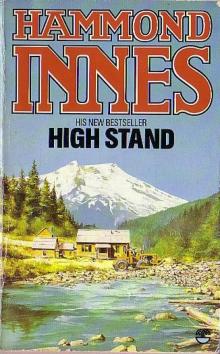 High Stand
High Stand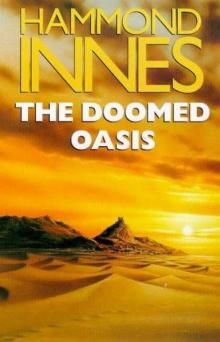 The Doomed Oasis
The Doomed Oasis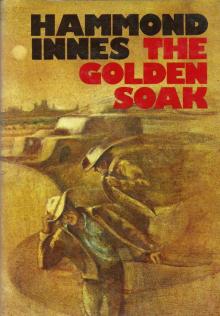 Golden Soak
Golden Soak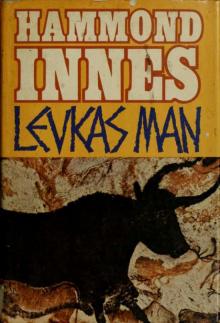 Levkas Man (Mystery)
Levkas Man (Mystery)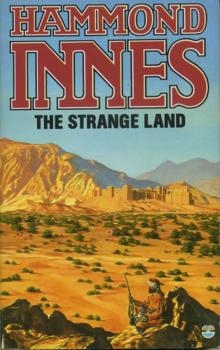 The Strange Land
The Strange Land Dead and Alive
Dead and Alive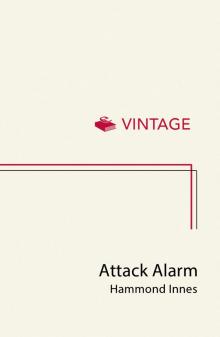 Attack Alarm
Attack Alarm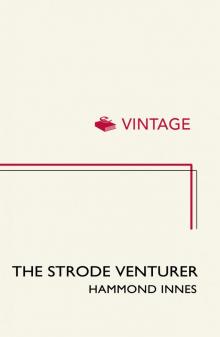 The Strode Venturer
The Strode Venturer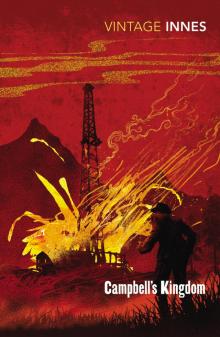 Campbell's Kingdom
Campbell's Kingdom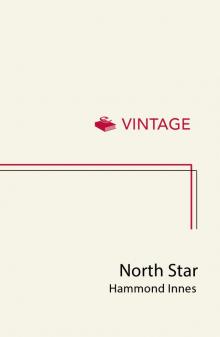 North Star
North Star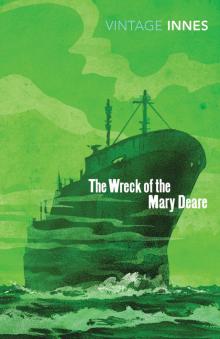 The Wreck of the Mary Deare
The Wreck of the Mary Deare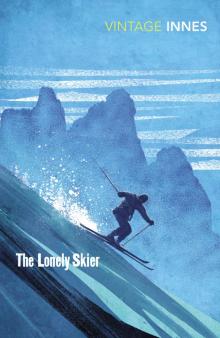 The Lonely Skier
The Lonely Skier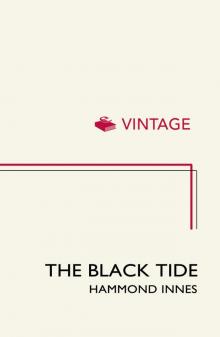 The Black Tide
The Black Tide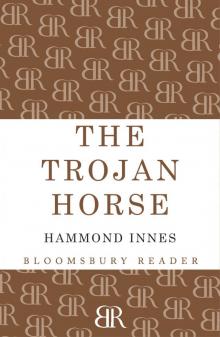 The Trojan Horse
The Trojan Horse Medusa
Medusa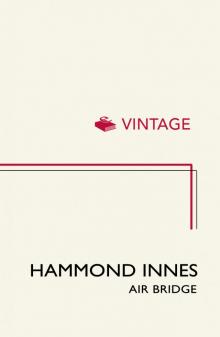 Air Bridge
Air Bridge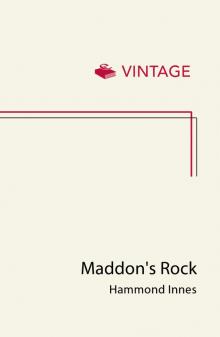 Maddon's Rock
Maddon's Rock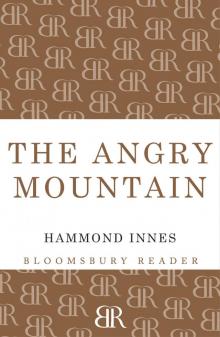 The Angry Mountain
The Angry Mountain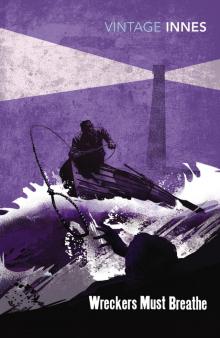 Wreckers Must Breathe
Wreckers Must Breathe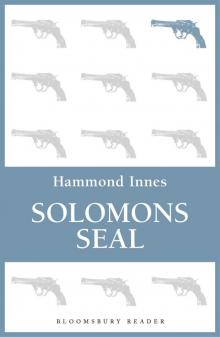 Solomons Seal
Solomons Seal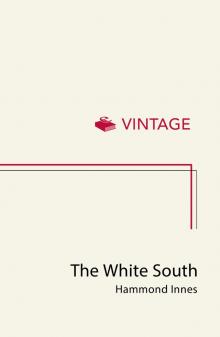 The White South
The White South